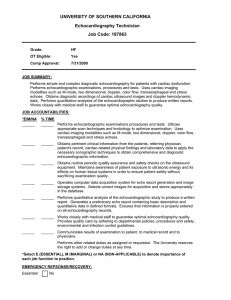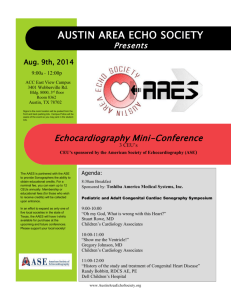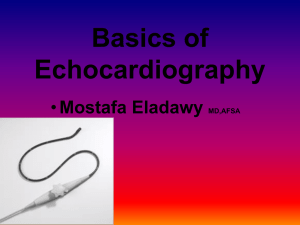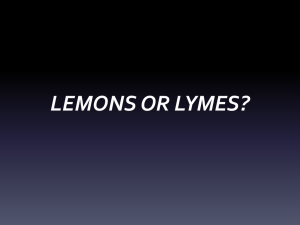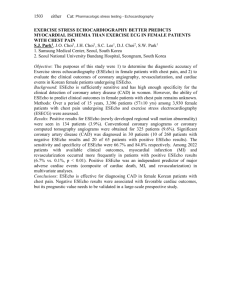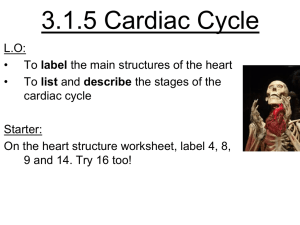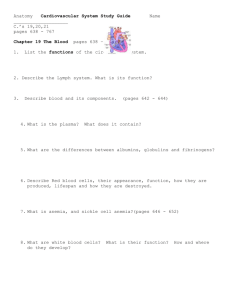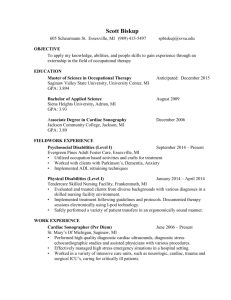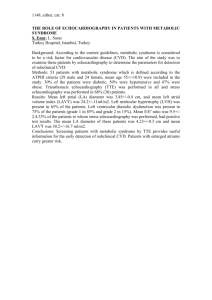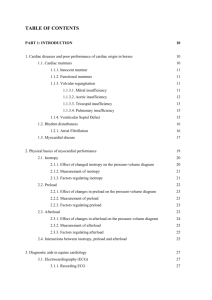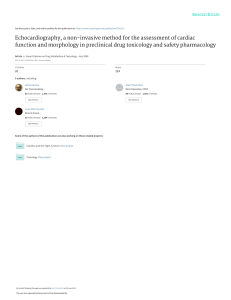ECH 213 - E
advertisement
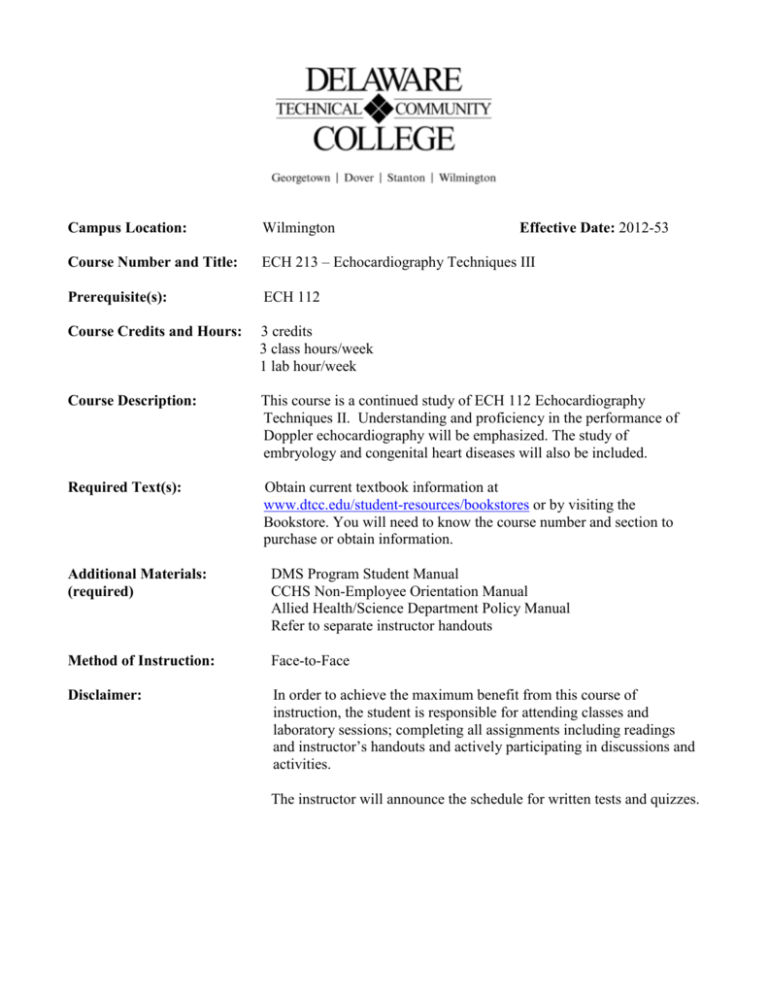
Campus Location: Wilmington Effective Date: 2012-53 Course Number and Title: ECH 213 – Echocardiography Techniques III Prerequisite(s): ECH 112 Course Credits and Hours: 3 credits 3 class hours/week 1 lab hour/week Course Description: This course is a continued study of ECH 112 Echocardiography Techniques II. Understanding and proficiency in the performance of Doppler echocardiography will be emphasized. The study of embryology and congenital heart diseases will also be included. Required Text(s): Obtain current textbook information at www.dtcc.edu/student-resources/bookstores or by visiting the Bookstore. You will need to know the course number and section to purchase or obtain information. Additional Materials: (required) DMS Program Student Manual CCHS Non-Employee Orientation Manual Allied Health/Science Department Policy Manual Refer to separate instructor handouts Method of Instruction: Face-to-Face Disclaimer: In order to achieve the maximum benefit from this course of instruction, the student is responsible for attending classes and laboratory sessions; completing all assignments including readings and instructor’s handouts and actively participating in discussions and activities. The instructor will announce the schedule for written tests and quizzes. Core Course Performance Objectives: 1. 2. 3. 4. 5. Discuss normal and abnormal anatomy of embryology, fetal cardiac development and cardiac chambers of septation. (CCC 1, 2, 5-7; PGC 1, 3, 5) Explain cardiac pathology, pathophysiology and hemodynamics in congenital heart disease. (CCC 1, 2, 5-7; PGC 1, 3, 5) Discuss clinical cardiology for cardiovascular surgery and interventional cardiology. (CCC 1, 2, 5-7; PGC 1, 3, 4, 5) Explain other diagnostic cardiac procedures and related echocardiographic diagnostic procedures. (CCC 1, 2, 5-7; PGC 1, 3, 4, 5) Apply with proficiency utilizing Doppler, color flow, velocity measurements, and calculations in the study of cardiac diseases. (CCC 1-7; PGC 1, 3, 4, 5) See Core Curriculum Competencies (CCC) and Program Graduate Competencies (PGC) at the end of the syllabus. Course objectives are coded to the competency(cies) they develop. Measurable Performance Objectives: The student will be able to: 1. Discuss normal and abnormal anatomy of embryology, fetal cardiac development and cardiac chambers of septation. 1.1 Discuss basic embryology of the heart. 1.2 Describe fetal circulation by tracing a drop of blood from the placenta, through the fetus, and back to the placenta again. 1.3 Describe the cardiovascular changes that occur at birth in the infant. 2. Explain cardiac pathology, pathophysiology and hemodynamics in congenital heart disease. 2.1 Discuss the definitions, prevalence, hemodynamics effects, associated anomalies and echocardiography findings of common congenital heart diseases. 2.2 Discuss different surgical procedures to correct a congenital heart defect. 2.3 Discuss the appropriate medical management of a patient with congenital heart disease. 3. Discuss clinical cardiology for cardiovascular surgery and interventional cardiology. 3.1 Discuss the different cardiac surgeries and interventional techniques. 4. Explain other diagnostic cardiac procedures and related echocardiographic diagnostic procedures. 4.1 Discuss the indications, utility and limitations of the following diagnostic cardiac procedures: a. Angiography and cardiac catheterization, b. Electrocardiography, electrophysiologic studies, Holter monitoring, stress testing c. Radionuclide studies and other tomographic imaging procedures d. Phonocardiography and external pulse recording 4.2 Discuss the indications, utility, limitations and technical procedures for related echocardiographic diagnostic procedures including: a. Stress echocardiography b. Transesophageal echocardiography c. Intraoperative echocardiography d. Contrast echocardiography e. Echo-guided procedures. 4.3 Discuss clinical pharmacology as it relates to echocardiography and provocative maneuvers including: a. Theory and use of provocative stress agents b. Non-pharmacologic stress c. Potential effects of cardiac medications on echocardiographic findings. 5. Apply techniques with proficiency utilizing Doppler, color flow, velocity measurements, and calculations in the study of cardiac diseases. 5.1 Distinguish accurate technique utilizing the standard Doppler measurements and calculations. 5.2 Differentiate normal and abnormal values of Doppler echocardiography. 5.3 Explain and evaluate the severity of valve stenosis and regurgitation by abnormal Doppler wave formation and the principle of color flow. 5.4 Compare and contrast normal and abnormal cardiovascular hemodynamics and flow patterns. 5.5 Calculate data obtained in the performance of an echocardiogram. 5.6 Demonstrate proficiency in the performance of two dimensional, color flow and Doppler echocardiogram. Evaluation Criteria/Policies: Students will demonstrate proficiency on all Core Course Performance Objectives at least to the 75 percent level to successfully complete the course. The grade will be determined using the College Grading System: 92 – 100 = A 83 – 91 = B 75 – 82 = C 0 – 74 = F Students should refer to the Student Handbook for information on Academic Standing Policy, Academic Honesty Policy, Student Rights and Responsibilities, and other policies relevant to their academic progress. Core Curriculum Competencies: (The competencies every graduate will develop) 1. Communicate clearly and effectively both orally and in writing. 2. Demonstrate effective problem solving and reasoning skills. 3. Work effectively in groups of people from diverse backgrounds. 4. Demonstrate ethical and professional understanding and conduct. 5. Apply appropriate information literacy skills to locate, evaluate and use information effectively. 6. Use computer technology appropriate to the field. 7. Use scientific and mathematical reasoning appropriate to the technology. CVS Program Graduate Competencies: (The competencies every graduate will develop specific to his/her major) 1. Perform competently a full range of echocardiography procedures. 2. Perform competently a full range of vascular sonographic procedures. 3. Utilize professional verbal, nonverbal, and written communication skills in patient care, procedure intervention, and professional relationships. 4. Act in a professional and ethical manner and comply with professional scope of practice. 5. Integrate critical thinking and problem solving skills as expected of a healthcare professional.
